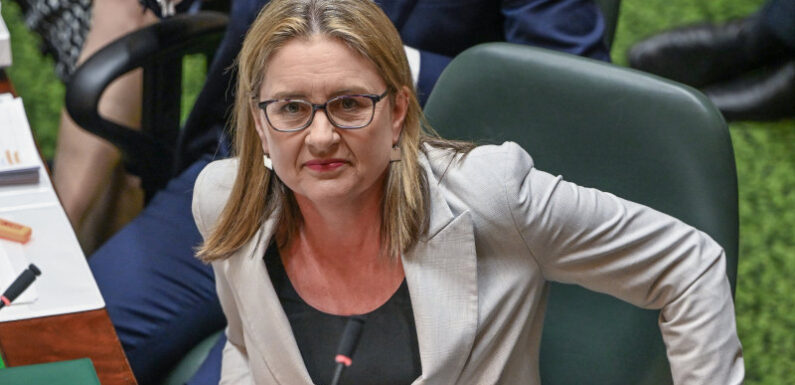
Save articles for later
Add articles to your saved list and come back to them any time.
Victoria will push ahead with a treaty process with the state’s Indigenous people despite Queensland and NSW slowing down plans for their own treaties.
The resounding rejection of the federal Voice to parliament in the two northern states has prompted their leaders to reconsider plans to negotiate an agreement with local First Peoples and had fuelled speculation Victoria could follow suit.
Victorian premier Jacinta Allan will push ahead with plans for a treaty with the state’s Indigenous people.Credit: Joe Armao
Victoria recorded the best result for the Yes campaign compared to all other states, but the referendum proposal was defeated as 55 per cent of the eligible population voted against it. Regional areas and Melbourne’s outer suburbs were more likely to have No majorities while Yes support was strongest across the inner city.
Although other states are reconsidering their approach, the Allan government has committed to push ahead with the treaty process and early work on negotiations are underway before the formal process in early 2024.
Support for the Voice in Victoria was discussed during Labor’s caucus meeting on Tuesday, including by Indigenous upper-house MP Sheena Watt, according to four MPs who attended.
Despite a swath of state seats voting No, there was not a push from MPs in these areas to rethink ongoing policies for Aboriginal Victorians.
One MP, who asked to speak anonymously to reveal private conversations, said the party did not think the No vote would transform into a movement against Labor. Backtracking on treaty could potentially be more politically damaging than staying on course, they said.
Victoria’s First Peoples’ Assembly co-chair, Ngarra Murray, said the Voice vote had strengthened their resolve to make treaty a reality.
“While we thought a federal Voice would have had its benefits and be complementary to our work, the outcome of the referendum doesn’t really change what we are doing here,” Murray said.
“Things are already in motion in Victoria, and we put in the hard yards making sure everyone in our community knows they are welcome to be part of this journey and that they can help choose the destination.”
Co-chairs of Victoria’s First Peoples Assembly Rueben Berg and Ngarra Murray.Credit: Justin McManus
The government is also considering its response to recommendations from the Yoorrook Justice Commission’s first truth-telling report, which called for Aboriginal Victorians to be given greater control of how they interacted with the criminal justice and child protection system.
Another MP said these proposals, including major reforms to the court systems, could be contentious if they weren’t handled carefully.
Speaking on Tuesday, Premier Jacinta Allan said she would continue working with the commission and the First People’s Assembly on both processes. She said the legislation to set up a treaty authority had bipartisan support when it was passed.
“We’ve had strong support here in the parliament for the mechanisms we’ve set up here in Victoria to better listen to Indigenous Victorians,” she said.
“That work hasn’t changed.”
Allan met the chairs of the First Peoples’ Assembly during the week and said she had spoken to leaders after the referendum result to offer her support and to assure them Victoria would maintain its current path.
Treaty and First Peoples Minister Natalie Hutchins, responding to questions from The Age about Labor’s plans for a treaty, said: “We know that a lot of First Nations people will be hurting after the referendum – Victorians want a better future for you, your communities and generations to come and that’s what we’ll continue to do through our treaty process.”
Speaking on the ABC on Friday, Opposition Leader John Pesutto said the Victorian Coalition had not changed its view in supporting the treaty authority laws, but would not be drawn on what would happen if further support was sought.
“My position today is that if and when the government wants to put something up, we’ll consider it,” he said.
“We’re not going to state positions at this point when we don’t know what the government is looking to propose.”
Nationals leader and opposition Aboriginal affairs spokesman Peter Walsh said he wanted to discuss traditional landowner agreements in Victoria before the treaty process.
This week, Queensland Opposition Leader David Crisafulli withdrew the Liberal National Party’s support for a treaty in the state, where the No vote polled at 69 per cent. Premier Annastacia Palaszczuk then said treaties would need bipartisan support to go ahead.
NSW Premier Chris Minns promised in January to start a year-long consultation process on a treaty with First Nations people. But after the Voice result, Minns conceded the process would be “complex and tricky”. The NSW government is reviewing its consultation process after the Voice result.
“What I’m saying in the aftermath of the referendum vote and the decision by Australians not to support it means that we have to go back to the First Nations people and talk to them. There’s no easy answers when it comes to next steps. I don’t have easy answers,” he said.
Get the day’s breaking news, entertainment ideas and a long read to enjoy. Sign up to receive our Evening Edition newsletter here.
Most Viewed in Politics
From our partners
Source: Read Full Article

